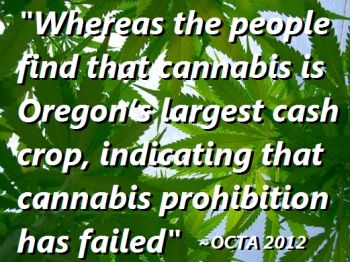DEA's myopic policy on industrial hemp hinders Kentucky's economy |
Lexington, KY - This past January, on the first day of the Kentucky legislature's 2011 session, state Sens. Joey Pendleton, Perry Clark, and Kathy Stein introduced Senate Bill 30, which would create regulatory and licensing procedures for Kentucky residents wishing to grow industrial hemp. The bill provides for criminal background checks of growers, sellers and buyers, as well as the monitoring and testing of hemp crops by local sheriff's departments and, in general, provides a regulatory framework for the production of industrial hemp in the commonwealth.
The text of the bill, which has repeated its predecessors' trajectories, languishing in the Senate Agriculture Committee until the legislature's recent adjournment, is identical to Pendleton's SB 14, which died in committee in 2010, and SB 131, also introduced by Pendleton and which also died in committee back in 2009. It seems evident, then, that neither the agriculture committee nor, one assumes, the full Senate has any intention of passing this bill any time soon.
Why not? The Kentucky legislature has already demonstrated a certain level of commitment to growing industrial hemp in the state with the 2001 enactment of House Bill 100, which established an industrial hemp research program under the oversight of the Department of Agriculture and encouraged investigation into the potential economic benefits of hemp production in Kentucky. Nor is the production of industrial hemp explicitly prohibited in the commonwealth, either by state or federal law.
All SB 30 and its predecessors sought to do was create a system by which Kentucky law enforcement could monitor the legality of hemp operations, ensuring that the level of tetrahydrocannabinol (THC, the active ingredient in recreational marijuana) in any hemp crops produced didn't exceed the legal limit of 0.3 percent, beyond which the plant is classified as a controlled substance. Though sheriff's departments might complain about the additional burden of background checks and crop testing, SB 30 is a sensible precursor to the development of an industrial hemp economy in Kentucky. So again: Why not?
Because there's little point in passing such a bill, or making industrial hemp a legislative priority, when the Drug Enforcement Administration will almost certainly deny any potential producer's permit application, as it has done consistently for decades. As things stand, citizens wishing to produce industrial hemp in the United States must seek a DEA permit and demonstrate the ability to comply with a rigorous set of security procedures, including prison-quality fencing, closed-circuit cameras, and (possibly) armed patrols. Yet those potential producers who have managed to install the necessary infrastructure and comply with the DEA's security requirements have still had their permit applications denied without exception and without adequate explanation. Why, then, bother creating the conditions in which a citizen of Kentucky might produce the crop?
The DEA has faced legal challenges in the last decade for its practice of universally denying permits, but all have been unsuccessful. The most notable recent challenge came from a pair of farmers in North Dakota, with the support of that state's legislature and governor, who sought to sell their product to Detroit car makers for use as panel and door insulation (one of the many uses of industrial hemp); currently, U.S. car makers import hemp for this purpose from Canada. As with other, similar legal challenges, judges in the North Dakota case deferred to the authority of the DEA, suggesting that the matter needed to be addressed in the U.S. Congress via clarification of the Controlled Substances Act of 1970.
This has not yet happened, although in 2009 Ron Paul, the Republican representative from Texas, introduced HR 1866, which sought to exclude industrial hemp from the Controlled Substances Hemp. The bill died, unsurprisingly, the moment it was referred to the House Subcommittee on Crime, Terrorism and Homeland Security.
That lawmakers saw fit to direct a bill on an agricultural issue to a committee concerned with terrorism is indicative of the ignorance of and insensitivity of the federal government to the economic benefits hemp would bring to the country's farmers. Confirmation of this regulatory myopia comes in the form of a 2001 DEA press release, in which DEA Administrator Asa Hutchinson was quoted as saying, "many Americans do not know that hemp and marijuana are both parts of the same plant and that hemp cannot be produced without producing marijuana."
This is patent nonsense, of course, as the strain of the hemp plant used for industrial purposes is useless for smoking, and the strains used for smoking are useless to industry. Nor, given the long history of both industrial hemp production and recreational marijuana use in the United States, and particularly in Kentucky, could one claim with a straight face that "many"Americans are unaware of the biological similarities between the two varieties of the plant. Yet this is the DEA's official position, and so industrial hemp permits are repeatedly denied in service to the drug war.
This state of affairs should be especially galling to Kentuckians, we citizens of one of the 10 poorest and most rural states in the country, for in practice the federal government is denying us the opportunity to improve our economic situation. This is a position that any objective observer could only describe as repressive and immoral, and one worthy of attack. In future columns, I will examine methods of doing just that, as well as outlining the specific economic benefits industrial hemp production could bring to the commonwealth.



 Publisher Bonnie King has been with Salem-News.com since August '04. Bonnie has served in a number of positions in the broadcast industry; TV Production Manager at KVWB (Las Vegas WB) and Producer/Director for the TV series "Hot Wheels in Las Vegas", TV Promotion Director for KYMA (NBC), and KFBT (Ind.), Asst. Marketing Director (SUPERSHOPPER MAGAZINE), Director/Co-Host (Coast Entertainment Show), Radio Promotion Director (KBCH/KCRF), and NIE/Circulation Sales Manager (STATESMAN JOURNAL NEWSPAPER). Bonnie has a depth of understanding that reaches further than just behind the scenes, and that thoroughness is demonstrated in the perseverance to correctly present each story with the wit and wisdom necessary to compel and captivate viewers.
Publisher Bonnie King has been with Salem-News.com since August '04. Bonnie has served in a number of positions in the broadcast industry; TV Production Manager at KVWB (Las Vegas WB) and Producer/Director for the TV series "Hot Wheels in Las Vegas", TV Promotion Director for KYMA (NBC), and KFBT (Ind.), Asst. Marketing Director (SUPERSHOPPER MAGAZINE), Director/Co-Host (Coast Entertainment Show), Radio Promotion Director (KBCH/KCRF), and NIE/Circulation Sales Manager (STATESMAN JOURNAL NEWSPAPER). Bonnie has a depth of understanding that reaches further than just behind the scenes, and that thoroughness is demonstrated in the perseverance to correctly present each story with the wit and wisdom necessary to compel and captivate viewers. 


